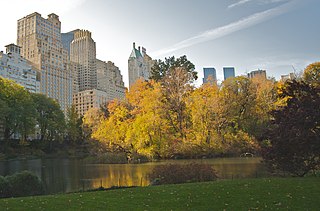
An apartment, or flat, is a self-contained housing unit that occupies only part of a building, generally on a single storey. There are many names for these overall buildings, see below. The housing tenure of apartments also varies considerably, from large-scale public housing, to owner occupancy within what is legally a condominium, to tenants renting from a private landlord.
A condominium, often shortened to condo, in the United States of America and in most Canadian provinces, is a type of living space similar to an apartment but independently sellable and therefore regarded as real estate. The condominium building structure is divided into several units that are each separately owned, surrounded by common areas that are jointly owned. Similar concepts in other English-speaking countries include strata title in Australia, Malaysia, New Zealand, and the Canadian province of British Columbia; commonhold in the United Kingdom; and sectional title in South Africa.

A landlord is the owner of a house, apartment, condominium, land, or real estate which is rented or leased to an individual or business, who is called a tenant. When a juristic person is in this position, the term landlord is used. Other terms include lessor and owner. The term landlady may be used for female owners, and lessor may be used regardless of gender. The manager of a pub in the United Kingdom, strictly speaking a licensed victualler, is referred to as the landlord/lady.

A housing cooperative, housing co-op, or housing company, is a legal entity, usually a cooperative or a corporation, which owns real estate, consisting of one or more residential buildings; it is one type of housing tenure. Housing cooperatives are a distinctive form of home ownership that has many characteristics that differ from other residential arrangements such as single family home ownership, condominiums and renting.
A leasehold estate is an ownership of a temporary right to hold land or property in which a lessee or a tenant holds rights of real property by some form of title from a lessor or landlord. Although a tenant does hold rights to real property, a leasehold estate is typically considered personal property.
Property management is the operation, control, maintenance, and oversight of real estate and physical property. This can include residential, commercial, and land real estate. Management indicates the need of real estate to be cared for and monitored, with accountability for and attention its useful life and condition considered. This is much akin to the role of management in any business.
As a legal term, ground rent specifically refers to regular payments made by a holder of a leasehold property to the freeholder or a superior leaseholder, as required under a lease. In this sense, a ground rent is created when a freehold piece of land is sold on a long lease or leases. The ground rent provides an income for the landowner. In economics, ground rent is a form of economic rent meaning all value accruing to titleholders as a result of the exclusive ownership of title privilege to location.
Commonhold is a system of property ownership in England and Wales. It involves the indefinite freehold tenure of part of a multi-occupancy building with shared ownership of and responsibility for common areas and services. It has features of the strata title and the condominium systems, which exist in Australia and the United States respectively. It was introduced by the Commonhold and Leasehold Reform Act 2002 as an alternative to leasehold, and was the first new type of legal estate to be introduced in English law since 1925.
A leasehold valuation tribunal (LVT) was a statutory tribunal in England which determined various types of landlord and tenant dispute involving residential property in the private sector. An LVT consisted of a panel of three; one with a background in property law ; one with a background in property valuation generally a qualified surveyor; and a layman, although some decisions of an LVT were decided by a single member. LVTs were non-departmental public bodies.
Multi-family residential is a classification of housing where multiple separate housing units for residential inhabitants are contained within one building or several buildings within one complex. Units can be next to each other, or stacked on top of each other. A common form is an apartment building. Sometimes units in a multifamily residential building are condominiums, where typically the units are owned individually rather than leased from a single apartment building owner. Many intentional communities incorporate multifamily residences, such as in cohousing projects.

The Golden Lane Estate is a notable 1950s council housing complex in the City of London. It was built on the northern edge of the City, in an area devastated by bombing during the Second World War.

Burrells Wharf is a riverside residential estate, owned by its leaseholders, in London, England in the south-central Docklands. Rectangular and adjoining on a shorter side the River Thames Burrells Wharf is in Millwall on the Isle of Dogs. The residential estate is one of 18 buildings or groups of buildings on the peninsula to be architecturally listed as buildings of special interest or importance.

The Landlord and Tenant Act 1985 is a UK Act of Parliament on English land law. It sets bare minimum standards in tenants' rights against their landlords.
Building management is a discipline that comes under the umbrella of facility management. Hard services usually relate to physical, structural services such as fire alarm systems, lifts and so on whereas soft services allude to cleaning, landscaping, security and suchlike human-sourced services.

Embassy Court is an 11-storey block of luxury flats on the seafront in Brighton, part of the English city of Brighton and Hove. It has been listed at Grade II* by English Heritage. Wells Coates' "extremely controversial" piece of Modernist architecture has "divided opinion across the city" since its completion in 1935, and continues to generate strong feelings among residents, architectural historians and conservationists.

Street v Mountford[1985] UKHL 4 is an English land law case from the House of Lords. It set out principles to determine whether someone who occupied a property had a tenancy, or only a licence. This mattered for the purpose of statutory tenant rights to a reasonable rent, and had a wider significance as a lease had "proprietary" status and would bind third parties.
The history of rent control in England and Wales is a part of English land law concerning the development of rent regulation in England and Wales. Controlling the prices that landlords could make their tenants pay formed the main element of rent regulation, and was in place from 1915 until its abolition by the Housing Act 1988.
Leasehold Reform Act 1967 is an Act of Parliament of the United Kingdom, which concerns English land law and compulsory purchase. A government bill, the law remains largely intact. It was passed by both Houses and had been tabled by ministers of the Labour government, 1964–1970.

James v United Kingdom [1986] is an English land law case, concerning tenants' (lessees') statutory right to enfranchise a home from their freeholder and whether specifically that right, leasehold enfranchisement, infringes the freeholder's human rights in property without being in a valid public interest.
In property valuation, a deferment rate is a discount rate applied to the current price of a property in order to assess the present value of the right to vacant possession of a residential property at the end of a leasehold to which the freehold is subject.








